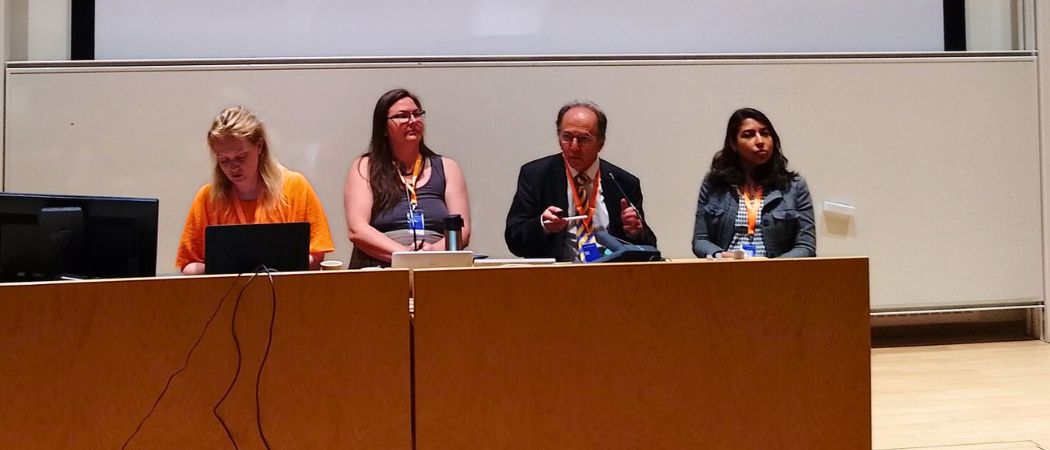Half of postdocs say they don’t have access to social security, a situation made even worse because many don’t have permanent contracts either. Now campaigners are putting pressure on the EU to lean on member states to improve working conditions for Europe’s young scientists

A conference organised by Europe’s post-doc association Eurodoc this week highlighted the impact of precarious working conditions in academia. Photo: Eurodoc / Twitter
Being a young researcher is hard: workloads are huge, it doesn’t pay well and permanent contracts are nearly impossible to come by. Brussels is now looking to step into member state territory and get the ball rolling on improving this dire situation across Europe.
A conference organised by Europe’s post-doc association Eurodoc this week highlighted the impact of precarious working conditions in academia, which leave many young researchers stressed and unable to plan for the future.
A survey of almost 1,800 post-docs conducted in more benign economic times 2018-2019 showed the situation was bad even then, with around half of the respondents having little access to social security and other benefits.
“Perhaps strikingly, or not if you’re familiar with the employment conditions of post-docs, only approximately half of the respondents had access to social security, such as healthcare, pensions, savings, unemployment benefits, sick leave or parental leave,” said Joanna Rutkowska, researchers at Radboud University in the Netherlands, who presented the findings of the study.
And this isn’t a problem only for the young scientists in question. Precarity in research employment has wider repercussions for research. In a global race for technological leadership against China and the US, Europe relies on retaining talent and getting the next generation of young mind to the labs.
But fewer and fewer young people can be convinced to embark on the research career path. “We really need to do something about it, and this is a call to action,” said Martin Andler, president of the Initiative for Science in Europe (ISE), one of the key research advocacy groups in the fight for better employment conditions.
The trends are worrying. Fewer people across Europe are choosing a career in academia. In 2020, there was a big drop in PhDs defended due to the COVID-19 pandemic. In 2021 the number went up in some countries, but did not compensate for recent years’ overall decrease in most countries. Only Switzerland, Malta, Romania and Lithuania have seen an increase in the numbers of scientists defending their PhDs.
To counter the trend, Andler and others have been campaigning for EU-level action. In January, ISE, Eurodoc and a number of other research associations handed the then-research commissioner Mariya Gabriel a manifesto calling the European Commission to action.
She promised to deliver, including piloting a partnership that brings together the Commission, member states and industry to coordinate financing and knowledge networks to improve working conditions for young researchers.
The Spanish government is rumoured to have put research careers on the agenda for it upcoming six-month presidency of the EU Council of ministers starting this July.
But little is certain. Spain is heading to the polls soon after the start of its presidency of the EU, and the vote could mean a change in government, and subsequently in policy priorities, including crossing research careers off the list of priorities.
In the Commission, meanwhile, Gabriel’s recent departure to become deputy prime minister in Bulgaria spells a loss of a big proponent for action on research careers in the driving seat of research policy, although few are worried her initiative will be dropped.
While Brussels has no say in how governments, research performing organisations and the private sector employ and pay their researchers, the hope was the push from the EU bubble would inspire change. Now, researchers will have to wait and see.
In the meanwhile, it’s important to continue speaking out, Andler told the meeting. “We don’t know if the Commission is going to take up this topic again respectfully with the fact that Mariya Gabriel is probably not going to be replaced,” said Andler. “Certainly, we should continue doing something about it, whether or not we get help from the Commission.”
The Commission was asked for a comment but did not respond by the time of publication.





 A unique international forum for public research organisations and companies to connect their external engagement with strategic interests around their R&D system.
A unique international forum for public research organisations and companies to connect their external engagement with strategic interests around their R&D system.